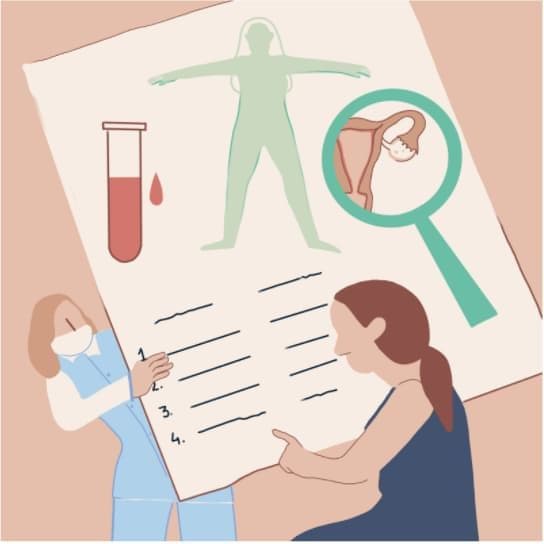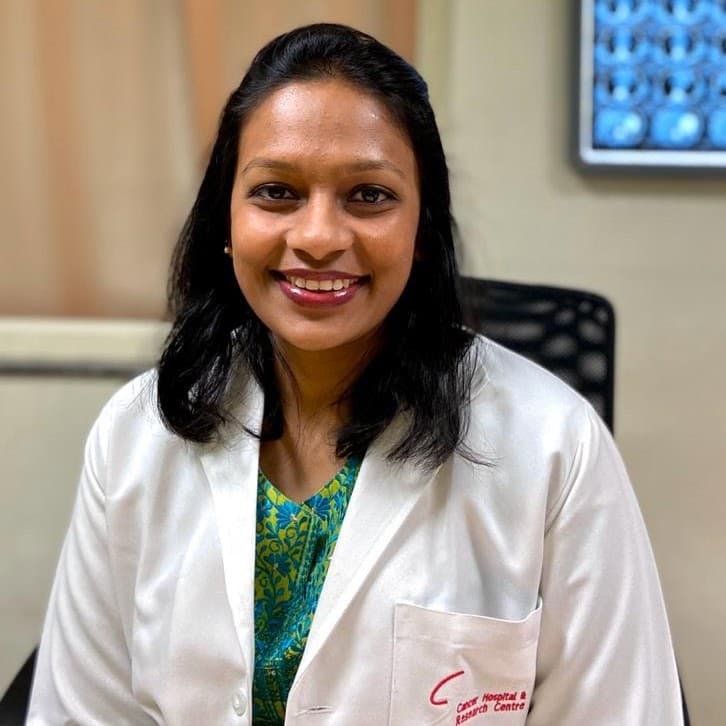This article has been compiled by Vaibhavi Kodnani, a content writer at Proactive For Her.
Breast cancer is an uncontrolled growth of abnormal cells in the breast. It results in a lump in the affected location. It usually originates in the milk ducts in the breast. Once it spreads to the neighbouring lymph nodes, it will slowly spread to other parts of the body.
Breast cancer can develop in both men and women, but it mostly affects women. One in 25 women in India is at risk of developing breast cancer, making it the most common cancer affecting women in India and the world. Both urban and rural women develop breast cancer, but urban women are at a higher risk.
It mostly occurs in the age group of 50-65 years. However, it does not eliminate the risk amongst younger women.
Symptoms of breast cancer
The symptoms keep changing as the disease advances. In the initial stage of breast cancer, the most common signs are:
- A painless lump in the breast
- Nipple inversion
- Nipple discharge
- Lump in the armpit
In the advanced stages, you may observe the following symptoms:
- Swelling of the whole breast
- A non-healing wound over the breast
- Orange peel appearance on the breast skin
- Redness of breast skin
- Pain in the breast
In the last stage, the symptoms worsen. You may experience the following:
- Bone pains (backache)
- Jaundice
- Breathing difficulty
Risk factors of breast cancer
Cancer depends on multiple factors resulting in a genetic change, which leads to uncontrolled growth of cells in the body. Several factors increase your risk of developing breast cancer but do not confirm that you will get it.
- Early menstruation
- Late-onset of menopause
- Never given birth
- Never breastfed
- Giving birth at an older age
- Toxic chemicals from pollution
- Smoking
- Drinking alcohol
- Obesity
- Lack of exercise
- Hormone replacement therapy
- Family history of breast cancer
- Radiation for childhood lymphoma
Diagnosis of breast cancer
Your doctor will perform three tests to confirm breast cancer.
Clinical examination: The doctor will do a physical exam to understand whether the lumps are cancerous or benign. They will also examine you thoroughly for other signs that may be indicative of breast cancer.
If the doctor suspects breast cancer, they will ask you to do a few other tests before concluding.
Mammography and ultrasound: Mammography uses digital X-rays; ultrasound uses sound waves to examine the breast. It helps the doctor detect the abnormalities in the breast.
Biopsy: Biopsy is the confirmatory test for breast cancer and performed after mammography.
Treatment of breast cancer
If diagnosed at an early stage, breast cancer is curable. The treatment for breast cancer would depend on the stage and type of cancer. An accurate diagnosis will allow the doctor to choose the best combination of treatment for you. Treatment options include surgery, chemotherapy, target therapy, hormonal therapy and radiation. There is always a risk of recurrence of cancer. Hence, regular follow-ups as per the doctor’s guidelines and advice post-treatment completion are crucial.
How to detect breast cancer early?
Mammography is a procedure to screen for breast cancer. The test frequency depends on your age, health conditions and if you are at a higher risk of developing breast cancer. Take your doctor’s advice on this matter.
35-44 years: annual mammography (consult your doctor)
45-60 years: annual mammography
Above 60 years: annual or biennial mammography
For those with a family history of breast cancer or known genetic risk, screening starts much earlier.
Breast cancer self-examination
Breast cancer self-examination is an effective way to detect it early and prevent its spread to other organs. You can perform this procedure on your own to detect abnormal lumps or swellings. You should consult your doctor immediately if you suspect any new and unusual changes in your breasts.
Who should do it: All women from 25 years of age
When to do it: Once every month; 2-3 days after your period ends.
How to do it: The self-exam involves six easy steps.
Perform steps 1, 2 and 3 in front of the mirror.
Step 1: Observe your breasts in the mirror for any unusual changes such as discharge, puckering, dimpling, scaling on the skin.
Step 2: Clasp your hands behind your head, press your hands forward and tighten your chest muscles. Notice any changes in the contours, size and shape of the breasts.
Step 3: Then, firmly place your hands on your hips and bow slightly forward to observe the same changes.
Perform steps 4 and 5 in the shower since it is easier to glide your fingers over soapy skin.
Step 4: Raise your left arm and use 3-4 fingers of your right hand to explore the left breast firmly and thoroughly with complete awareness. Cover the entire breast - begin at the outer edge and slowly move towards the nipple in circles. Pay special attention to the area between the breast and the armpit, including the armpit. Feel for any unusual lump or mass under the skin. Repeat the same with the right breast.
Step 5: Gently squeeze your nipples and look for a discharge.
Perform step 6 while lying down on the bed as it flattens the breast, making it easier to examine.
Step 6: Lie on your back on the bed, place a pillow or folded towel under your left shoulder, keep your left arm over your head. Now perform steps 4 and 5 - move your right hand in circular motions over your left breast to check for any lumps and pinch your nipple for any discharge. Repeat the same with the right breast.
When to visit the doctor: The majority of the breast lumps are benign or non-cancerous. But, if you notice a lump or any other symptom in your breast, it is best to consult a doctor who can diagnose to differentiate between benign and cancerous growths.
Breast cancer prevention
Certain lifestyle changes may help prevent breast cancer. It includes quit smoking and alcohol, breastfeed your child, exercise regularly and monthly perform breast cancer self-examination.
FAQs about breast cancer
Does breast cancer affect the menstrual cycle?
Breast cancer does not affect the menstrual cycle. However, during chemotherapy, the menstrual cycles may cease temporarily or permanently.
Can one get breast cancer during pregnancy?
It is a rare occurrence and is usually aggressive. But if it happens, the doctor and patient should discuss the stage and various options to decide the further course of action.
Does breast cancer happen in one or both breasts?
Cancer can occur in both breasts and usually affects those with hereditary genetic mutations.
Can one get pregnant after breast cancer?
Yes, it is possible. The woman should discuss her reproductive health with the doctor after her treatment is over.
Can one breastfeed after breast cancer?
Yes, a woman can breastfeed if her breasts are intact.
Breast cancer support
If someone from your family is diagnosed with breast cancer, you must offer your complete support to them. Caregivers play a major role in the patient’s recovery. They should understand the patient, learn how to take care of them and communicate their needs with the doctor. During this, the caregiver should take care of their health too. Cancer can take a toll on the patient’s and family’s mental health. Hence, regular counselling and support are crucial. Talking to other patients who have gone through the same experience can give you beneficial tips to cope with difficult times.
Bottom line
You should openly discuss your sexual and reproductive health with your doctor. It is necessary to be aware of your body and take care of it. Follow your doctor’s advice and go for regular tests. If you know someone diagnosed with breast cancer, give them your support and motivation to recover from it.
This information is provided for educational purposes and should not be construed as medical advice. Please consult with your healthcare practitioners before undertaking any changes in your diet or adding supplements.
Proactive is a digital clinic for women, offering accessible, personalized, and confidential health-care solutions. We offer products and services for out-patient health concerns of Indian women, across their lifetime - from puberty to pregnancy to menopause. To know more on the sexual and reproductive health of women, visit https://www.proactiveforher.com/

